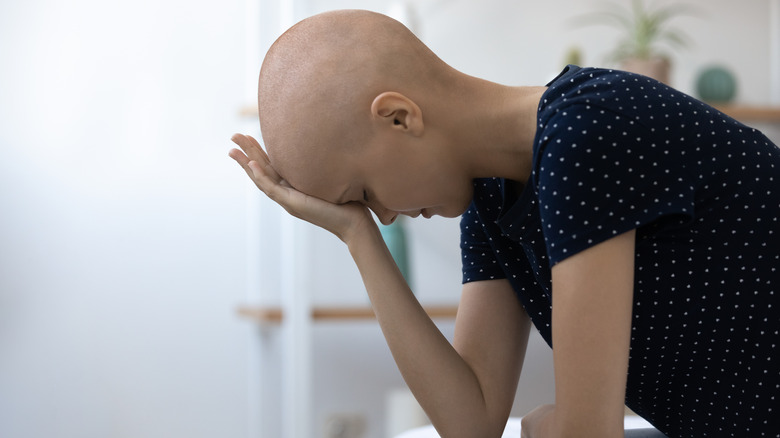Can You Still Go About Your Daily Life While Undergoing Chemotherapy?
Undergoing chemotherapy treatment can be extremely stressful, and you may be longing to return to your daily activities. According to Cancer Research UK, chemotherapy can take a toll on both physical and emotional health, and the strain often affects both the patient and their caregivers. Chemotherapy has been documented to impact a range of activities, from necessary tasks like eating to enjoyable social moments. However, it's important to note that everyone experiences chemotherapy differently. Since the treatment can be used for both curative and palliative means, the individual circumstances vastly vary.
Chemotherapy is one of the most commonly utilized treatment options for cancer diagnoses, according to the Mayo Clinic. The treatment is drug-based and carried out by inserting powerful chemicals into a person's body. The intent is to fight the metastasizing — or quickly growing — cells that are harming the body in the form of cancer. Chemotherapy is an umbrella term for several types of drugs used to treat cancer. Each person's treatment plan is unique and may be exclusive to chemotherapy, or include other treatment methods alongside chemotherapy.
Chemotherapy is a strong means of treatment that can be effective in addressing rapidly metastasizing cancer cells. However, the high concentration of chemicals injected into the body during the treatment sessions can carry intense side effects. The strain on your body and the time needed for chemotherapy infusions can interfere with daily life, including work and relationships.
The physical disruptions of chemotherapy
When it comes to determining how chemotherapy will affect your daily life, the American Cancer Society advises that four factors should be taken into consideration — how your daily life will be impacted and whether you can continue with daily activities (based on the stage of your cancer diagnosis), your general health, the specific drugs and concentrations used in your chemotherapy treatment, and the type of work and activities you take part in during your daily life. When undergoing chemotherapy, it's important to be mindful that your schedule and health needs may change, so you should try to be flexible with your calendar. If you are comfortable sharing your health experience, speaking with your supervisor and colleagues about how chemotherapy may affect your work hours can help accommodate your job duties and treatment sessions.
There are many physical side effects of chemotherapy that you should be aware of when making decisions about your daily schedule. Common side effects of chemotherapy include nausea, vomiting, fever, constipation, diarrhea, decreased appetite, bruising, bleeding, hair loss, oral sores, and pain throughout the body (via Mayo Clinic). If you experience any of these side effects while undergoing chemotherapy, it may be difficult to continue with your daily life. In addition to stomach upset, gastrointestinal issues, and other undesirable physical side effects, chemotherapy can cause significant fatigue and exhaustion. This can disrupt daily activities and even your ability to complete work or family obligations.
Exercise is important during chemotherapy
While the physical side effects of chemotherapy can interfere with daily life, it's important to incorporate exercise before, during, and after chemotherapy treatment, per the American Cancer Society. Exercising may be the last thing you want to do when you're experiencing nausea, an upset stomach, pain, or feeling exhausted. You should always consult your doctor about what is appropriate to do during your unique treatment, but physical activity can have many benefits. For both physical and emotional health, try to maintain as many activities in your daily life throughout your treatment. Be kind to yourself if some activities are difficult to do while you're undergoing chemotherapy.
In general, exercise can increase mood and decrease depression (per Mayo Clinic). During chemotherapy treatment, try to exercise for periods of 10 minutes at a time and incorporate stretching at least twice a week (per American Cancer Society). Prior to beginning chemotherapy, you may experience an easier recovery from treatment if you engage in regular physical activity. Once you begin chemotherapy sessions, it's normal to experience a decline in the amount of exercise you can complete. Don't pressure yourself to complete exercise routines that strain your body during chemotherapy — instead, find milder ways to be physically active, like taking slow walks. Once you complete chemotherapy, the side effects of the chemical infusions should begin to disappear and you can gradually increase your physical activity regimen.
The emotional impact of chemotherapy
The stress of undergoing chemotherapy can have significant effects on daily life, particularly when it comes to your emotional health and relationships with the people in your life. A 2012 study published in Annals of Behavioral Medicine found that chemotherapy treatment poses side effects of extensive fatigue, depression, and stress on relationships. The fatigue that can come with chemotherapy chemical infusions can lead to depression, which may strain relationships and cause emotional disturbances. Caregivers are also at risk of becoming emotionally drained and stressed during the chemotherapy process (via News Medical Life Sciences).
Chemo brain is another experience that can affect your emotional health during treatment, per WebMD. Symptoms of chemo brain include difficulty remembering things like names, words, and everyday items. Not being able to remember simple things like dates or the names of ordinary objects can lead to further stress and depression. Furthermore, chemo brain can bring with it mood swings that are compounded by fatigue, sleep disturbances, and emotional tension.
Experiencing chemo brain can affect your ability to complete daily activities, but there are some actions you can take to combat the effects of chemo brain. Recommendations include exercising for at least five minutes a day, keeping a notebook on you to write things down, and keeping your brain active by completing puzzles or learning a musical instrument. Preparing these things before beginning treatment can help you continue with daily life during chemotherapy.




